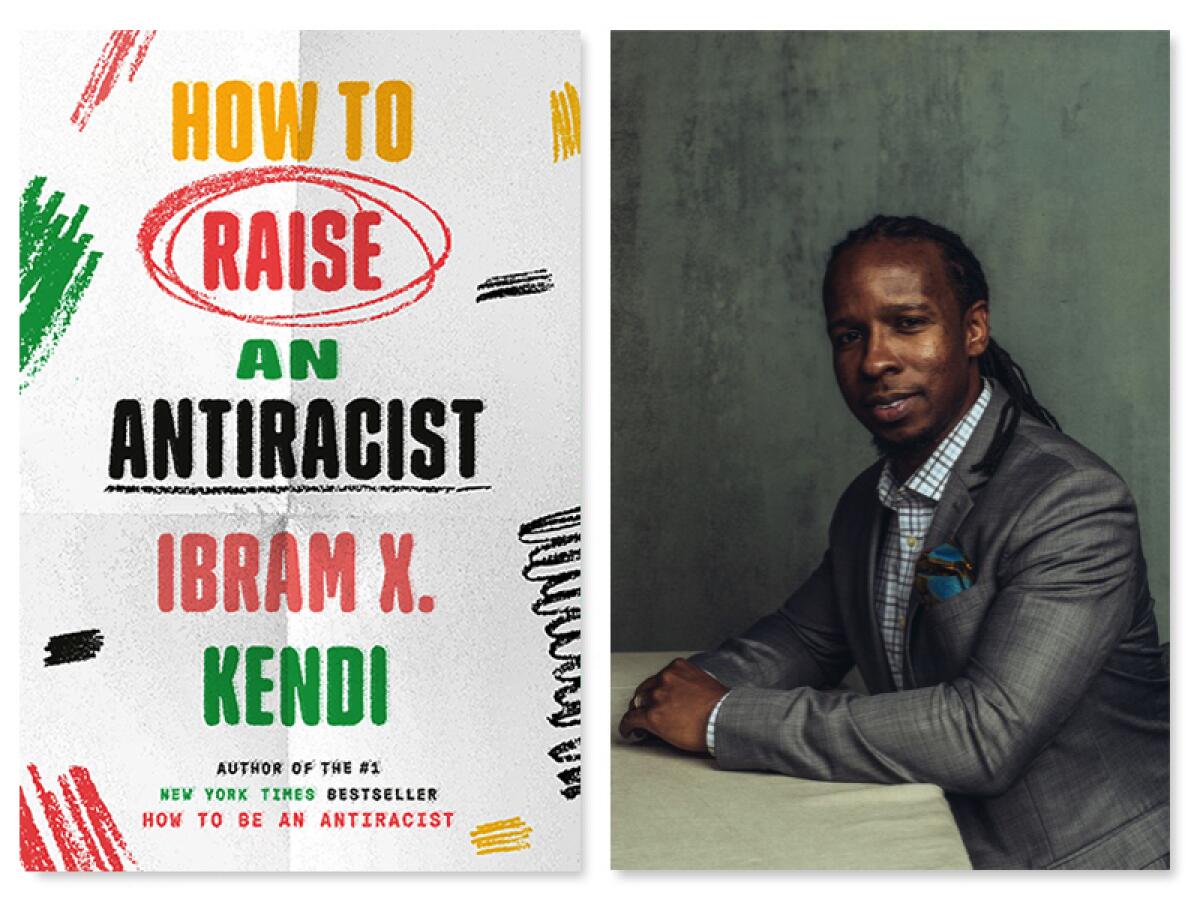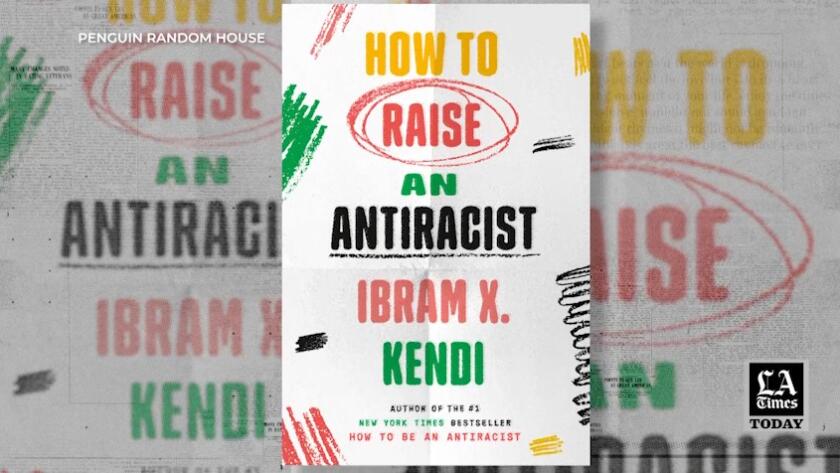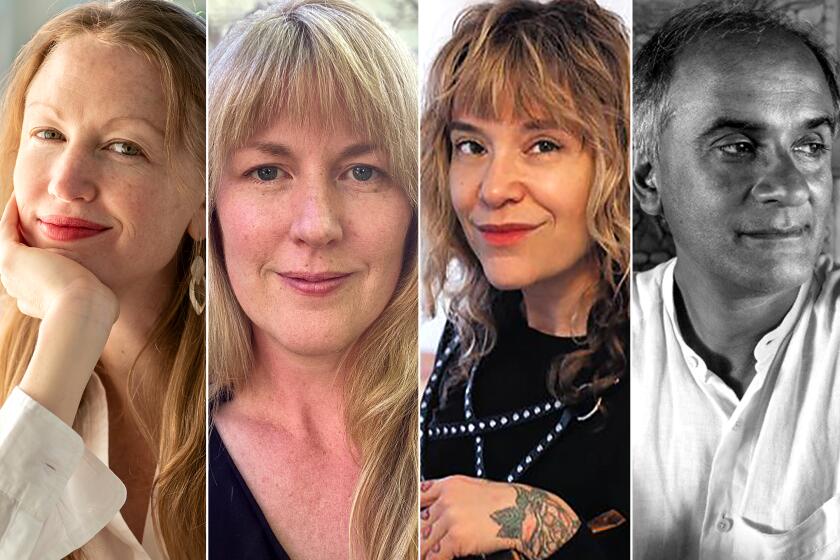How can we protect our kids from racism? Author Ibram X. Kendi has this advice

- Share via
When an advance copy of Ibram X. Kendi’s new book, “How to Raise an Antiracist,” arrived in my mailbox, the massacre in Buffalo hadn’t yet happened.
Nor had the shooting in Laguna Woods, where another gun-toting man is accused of killing out of hatred.
So much sorrow in a single weekend. Few of us were shocked, but for me, the mother of two mixed-race girls, the Buffalo shooting and Kendi’s book collided in a painful and deeply personal way I didn’t expect.
The 18-year-old accused of the carnage in New York left behind a disjointed and childish manifesto that singles out not only Black people, but mixed-race marriages — and the children of them — as something to be eliminated.
In his worldview, my children deserve to die.
I’ve seen my kids deal with racism before, and conversations about race are common in our house. But to read those words, and know someone who had never met my kids could hate them so much simply for what they are, not even who they are, scared me — in the way Black and brown parents in America have long been terrified by the vulnerability of their children.
That kind of racism is an ugly reality, but one that also took on new importance for Kendi in 2017, when his 1-year-old daughter, Imani, developed an attachment to a blue-eyed, blond-haired doll, and later when she began preschool. He began to think about what it would take to help her grow up without the pervasive “smog” of white supremacy surrounding her.
- Share via
Watch L.A. Times Today at 7 p.m. on Spectrum News 1 on Channel 1 or live stream on the Spectrum News App. Palos Verdes Peninsula and Orange County viewers can watch on Cox Systems on channel 99.
How would he speak with her about race and racism? How would she experience race as a toddler, a teen and a young woman? How are the structures of racism affecting our kids, when so often we barely see them ourselves, or at least, barely acknowledge them?
How could he and his wife, Sadiqa, a pediatrician, protect this beloved child, and surround her with promise and strength?
Kendi is a humanities professor at Boston University, founding director of the BU Center for Antiracist Research, and the author of eight books — five for adults and three for children — including “Stamped From the Beginning: The Definitive History of Racist Ideas in America,” winner of the National Book Award for nonfiction in 2016, as well as the 2019 bestseller “How to Be an Antiracist.”
“How to Raise an Antiracist,” which comes out June 14, is aimed at teachers, caregivers and parents like me who don’t just want to do better, but feel an urgency to find ways to ensure our children have the armor and insight to navigate a country that seems to be backtracking not just on racial equity, but on human rights.
On June 22, Kendi will join the L.A. Times Book Club to discuss his new work.
I spoke with him two days after the Buffalo shooting, and he told me that he wished he “did not feel so compelled” to write this book — “that it was unnecessary.”
But even recent events hadn’t shaken his belief that parents can create secure environments and better outcomes for their children.
“That’s the very reason why the fundamental argument of the book is that to raise a child to be antiracist is to protect that child,” he said. “There’s so many white children who are being indoctrinated into racist ideas and then hurting other people, killing other people, when they come of age as adults — just as you have many children of color who are thinking that there’s something wrong with themselves, or are the victims of those who believe in racist ideas.”
One of the most basic — yet important— pieces of wisdom in the book is simply to create space not just to talk about race, but to process its experience as it happens. That’s where teachers and caretakers come in.
But in today’s loaded climate, where critical race theory has become a boogeyman under the desk of every public school child, it’s not so easy. Kendi challenges the idea that silence means we aren’t teaching about race.
“In reality, as parents and teachers and caregivers, we’re talking about race even if we’re not saying any words,” he said.
When we are walking down the street and cross to avoid a Black person that may be perceived as dangerous. When you have no Asian or Latinx friends.
“There’s so many ways that people talk about race, that are in a racist way, that cause their kids to think that certain people are not valued,” he pointed out.
“I’m trying to sort of change the conversation to not whether we should talk to our kids about race, but what should we be saying to our kids about race, as we talk to them verbally and nonverbally?” he said. “Should we be expressing to them that everyone, no matter what they love, no matter their background, is valuable and worthy of our respect?”
Of course, it’s not so easy as just being aware.
Kendi says that black teenagers experience or witness an average of five instances of racist discrimination per day, according to a 2019 study by Rutgers University researchers. Five times a day, a child of color receives messages of fear, belittlement or hate.
That is an astounding and heartbreaking number, and something that is tough to insulate kids from, especially as they get older. Recently, when I picked up a carload of kids from school, I had to explain to one why forwarding an antisemitic meme could never be done as a joke or in irony, as he meant it — how it caused harm no matter his intent. If you think your kids aren’t exposed to this stuff every day, you are flat-out in denial.
“They’re going to experience it; they’re going to witness racism,” Kendi said. “The question for the teacher, the question for the caregiver or the grandparent or the parent, is how are they processing? And that’s where the parent and the teacher come into play; that’s where we can be useful to ensure that they’re processing it in an antiracist sort of fashion.”
And what about that so-called patriotic argument that all this talk of race makes white kids feel guilty?
“It is striking that so many people just assume that if we teach the history of racism and Jim Crow and slavery, that the storylines will always have white people as the villains,” he said. “If we teach the history of racism, we teach the history of slavery, if we teach what’s happening today, we’ll be teaching [that] an interracial group of people fought against racism and Jim Crow and slavery — which includes white people.”
“We can teach about someone like William Lloyd Garrison, who founded the Liberator, which became the premier abolitionist newspaper during the enslavement era. You can’t accurately and fully teach the history of slavery without teaching those who are challenging it.”
In “Letter to a Stranger,” 65 writers share their most memorable travel stories.
Kendi’s book, and our conversation, made me feel slightly better about the future. I don’t think the next generation will live in a colorblind world. To be honest, I am not sure the coming years will even be safer.
But his advice comes from a place of much-needed hope and optimism that even in an age when teenage boys can be radicalized into murder by memes and hackneyed tropes, we have the power to arm the next generation with the knowledge, courage and fortitude to do better than we did.
“We are leaving them a fight,” Kendi said. “But hopefully, we will leave them much better equipped to win that fight than we were.”
If You Go: Book Club
What: The Los Angeles Times Book Club hosts a conversation with Ibram X. Kendi on “How to Raise an Antiracist.”
When: 7 p.m. June 22
Where: In person at USC’s Bovard Auditorium. Get tickets at Eventbrite.
Info: latimes.com/bookclub
More to Read
Sign up for Essential California
The most important California stories and recommendations in your inbox every morning.
You may occasionally receive promotional content from the Los Angeles Times.
















